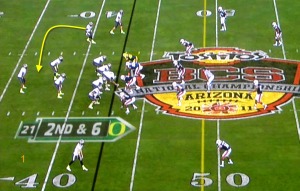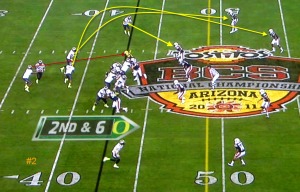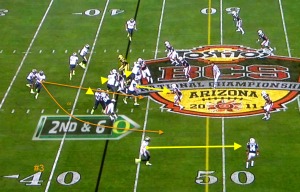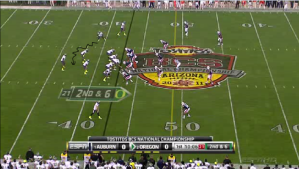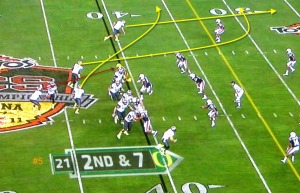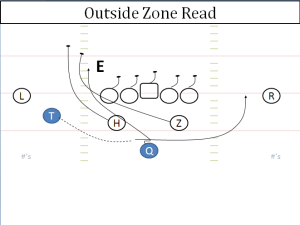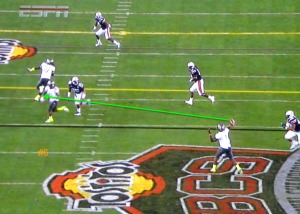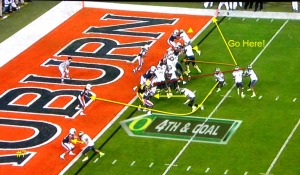>
[Editor’s note: Second in a series by FishDuck on the innovations in the Oregon offense.]
Are we ready for football? For me, the pain of the National Championship loss has been replaced by the excitement of Spring Football and all the questions swirling that will create the drama and entertainment to be discussed until fall camp. We have so much to see this spring, and one of those questions concerns the use of the new formations and plays we saw in the NC game. In the last report I described the “Slash” formation and the plays that have been revealed thus far off those Forward and Backward Slash sets. They are fun to ponder, but the OTHER set of formations/plays we saw really rocked my boat. I have been considering the offensive implications for a couple of weeks now as I was stunned at what I saw on the field from the ZenSpreadmaster, Chip Kelly. (Remember—we amateur writers CAN have some fun with this)
You may recall that a crucial component to the success of the Zone Read is how when a DE is unblocked and “Read,” on the backside of the play,–the blocking responsibilities shift one player over to the playside for the Offensive Linemen. The result is an extra blocker on the side that you’re attacking, and THAT my friends is a HUGE advantage that teams have had difficulty defeating. It is to me, the biggest reason as to why Oregon has lead the Pac-10 and been one of the nation’s leaders in rushing since the Spread Offense was introduced at Oregon. While ESPN or FOX haven’t picked up on it over the last SIX years, we as feathered friends have learned and discussed it on assorted Duck Media/Message Boards. Teams are defending it better with a variety of stunts, and now as they are feeling better about facing it—Coach Kelly unveils a new innovative approach in creating a blocking advantage within the Spread Offense through our BACKFIELD. Oh Geez.
We have to remember that change is Chip’s forte; whether it is the series strategy in the Stanford game of attacking the middle, the edges, and then downfield—or the “Cal” counter-to-the-counter introduced in the Arizona game with a change in blocking schemes—Chip mixes it up for the opponent. He will introduce something for a game or two, and then put it back in the tool box for another day. The question is whether the new formations/plays at the NC game are simply tools or a fundamental shift in the offensive strategy? I believe the answer resides in the attacking philosophy of the new “Dual H-Back” formation.
If we go to 10:06 in the 1st Qtr we see two WRs on the left, and two DUAL H-BACKS positioned on both sides of where the ball is snapped. They are about halfway back between the center and the QB and with the ball shotgunned back to Thomas—they can go anywhere. On this play we see one of the WRs go in motion from left to right; when the ball is snapped the H-Backs go left to block downfield on the outside. The WR in motion is actually a RB and he is passing in front of Darron; what we see is an Outside Zone Read with the motion man being the RB, yet we have conflicting motion going the other direction from the H-Backs. This play is a winner, but Thomas is inexperienced working it and muffed this one up.
The left DE (from our view) is being Zone Read, thus when he stayed put initially—Darron should have put it in the breadbasket of the RB zipping by. If he had, then the play would have gone outside to the right for big yardage with the blocking set. If he had pulled the ball and charged HARD outside to the left–then he would have beaten the DE to the corner and with two H-Backs and a WR blocking, (an impressive wall to the left outside was set) he would have gained a nasty bit a turf on the Tigers. Instead he pulled and hesitated, thus the DE gained an angle to deny the outside and Thomas had to run wherever he could and lost two yards. It was another example of how the play could have worked EITHER direction, but execution muffed it up. I LOVE this play and we WILL get better at it!
The two H-backs have gone out into pass patterns to the left with one at middle depth, and the other H-Back that was on the right side to start the play flares out in the left flat. Darron hits the near man and LaMichael runs for an easy first down. Sweet play action pass off a running formation and what I didn’t notice until watching it for the fourth time? Maehl was open over the middle as he went from right to left in his pattern. Good running formations like this CREATE passing opportunities! We love it!
We see another impressive variation of this formation at 11:05 in the 2nd Qtr as we see the Dual H-backs lined up with a man in motion going left to right and one of the H-backs is going to the right at the snap for pass protection while Darron throws left for a screen pass Touchdown to the left H-Back, who was LMJ! You have to be so aware of the running possibilities with this formation that passing from the play-action becomes a high probability result. Dual H-Backs inside the ten yard line shouts power play as you can concentrate your blockers to a side and defenders don’t know where you are attacking. Washington State scored a TD against us on the ground pounding us with a somewhat similar set although their H-Backs stood side-by-side to the QB.
An Outside Zone Read going one direction against the flow of a power group (the H-Backs) as we have just discussed is an intriguing new twist to the usual Outside Zone Read that we have become accustomed to seeing. It sets up some interesting possibilities when we are in the Red Zone and at 3:06 in the 3rd were examples back-to-back.
We are on the six yard line and threatening to score when we line up in the Dual H-Back look; we have a slotback (Barner) coming in motion from the left to the right and at the snap we have BOTH H-Backs going left with Darron Thomas the QB, following them. As Barner zips by the QB—the ball is placed in his hands going the opposite direction of the flow and the strength of the formation. The play is designed to be somewhat a Zone-Read-jet-sweep, and like the usual Outside Zone Read, the RB has the choice to turn upfield wherever he sees the hole open up. On this on 3rd down play, Barner sees the DE on our right side coming outward to stop the run around the right end, but his movement outside created a hole inside the D-Line, and thus the RB ran for almost six tough yards in a Guard/Tackle hole inside from an Outside Zone Read to the right against the power motion going left.
This new formation suggests a ton more is going on with Chip’s Offensive Philosophy than we might consider from our first exposure to it. When both H-Backs are lined up with one on each side of where the center is snapping the ball—it doesn’t allow the defense to know which side we are going to, hence they have to line up balanced to counter it. Then, when we move those H-Backs one direction we create a numerical advantage with our blockers on one side! Chip has gone from creating an extra blocker on the LOS with the Offensive Linemen to creating an extra blocker on one side from what we have positioned in the backfield! These are actually the fundamental components of the Wishbone from the 70s and 80s; line up balanced and attack one side to create a blocking advantage while using Optioning components to create further difficulties for the defense. What is the end result when we line up in the Dual H-Back formation (which looks like an inverted Wishbone from behind) and run to one side generating a blocking imbalance and yet implementing a Zone Read at the same time? That’s a SHOTGUN WISHBONE approach my friend! Holy Crap.
The recruiting again continues to make more sense as an abundance of TEs (H-Backs) are going to be needed, and it will be a ton of fun for them to play in this offense. Imagine if you’re an Outside Linebacker and coming around the corner are two 6’5” 250 lb. H-Backs in White, Williams, or Lyerla coming up with head of steam and looking to hurt you. (I’m looking to take a dive) Or they could blow past you for an open pass as you brace for the blasting block. Sometimes an H-Back is actually a RB who is going out for a pass, coming in motion as a handoff or pitchman or moving inside for a shovel pass. Two RBs on the field will become common for us! I love the new Dual H-Backs and the Slash formations in how they attack a defense inside and outside, either direction, or vertically downfield via the pass while retaining the consistent component of having a numerical blocking advantage on the side we’re attacking. Way too cool.
I am picturing the defense’s difficulty in defending the entire field, getting lined up properly, and doing this during Oregon’s gasping No-Huddle regimen? The potential to create errors by the defense just went up significantly! Are we really running a “Shotgun Wishbone?” No. Just as the play where the H-Back/TE was leading the way for the RB like a traditional “I” offense doesn’t mean that we’re running an “I” or a Wishbone, but borrowing some of their concepts for Chip’s overall unique attack. Yes, I hope these additions are permanent to the offense as the entertainment factor will go up another full level as the wonderfully talented skill players make use of their gifts in open space. I’ll be watching for these formations in the spring and fall camp!
We really love to ponder our Ducks,
FishDuck
Charles Fischer [email protected]
Add The Sports Daily to your Google News Feed!

